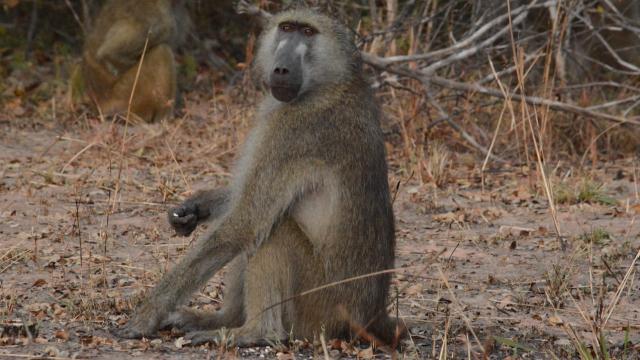The secrets of the animal kingdom just might be hidden within piles of animal crap.
A hybrid baboon at Kafue National Park in Zambia. These baboons inspired the faecal DNA sequencing work. Image: Kenneth Chiou
That, at least, is the working theory of two scientists who have come up with a method for sequencing the entire genome of baboons and other mammals, using the animals’ poop. Eventually, the technique might be used to shed light on some of the world’s most poorly-studied wild animals.
Kenneth L. Chiou and Christina Bergey were anthropologists studying how genetic material is transferred between different species of baboons in the Zambian wilderness, but they kept running into trouble collecting baboon blood samples they needed to complete their work.
“Baboons are really big and really smart,” Chiou told Gizmodo. “It’s hard to trap them.”
Chiou would build cages and bait the animals with dried corn, then spend months trying to convince them to not run away when they saw him, or when he approached the cage to close it after they’d taken the bait. Even those baboons he managed to trap would often get away.
“They broke my cages. They popped out of my cages. It was really hard,” he said. “But we thought that if you could do this with faeces you could do it without all of that trouble. Even if they run away from you, they leave droppings you can go and pick up.”
Chiou, a PhD student in his final year at Washington University, and Bergey, now a post-doc at Penn State, currently have a paper on their method for studying baboon genetics using poop under peer review. (A pre-print can be found here.) They have already put the method — dubbed “FecalSeq” — to use in their own work.
Extracting DNA from animal poop is nothing new. But previously, it has been difficult to sequence more than small snippets of an animal’s genetic code from its faeces. The trouble is that there is lots of bacteria in poop, and it can be difficult for DNA sequencing technology to tell DNA from the bacteria and its host animal apart. Not to mention, DNA in faeces is often fragmented and scarce.
What Chiou and Bergey have done is develop a cheap, easy way to separate bacterial DNA from its host’s. There are short stretches of DNA, called CpG islands, that bind themselves to other parts of the DNA molecule during a process called methylation. In animal and bacterial genomes, the density of CpG islands during methylation is distinctly different. The pair was able to exploit this difference in density, using proteins to selectively bind and isolate animal DNA, then using magnets to separate it out.
This work was a riff on earlier work by scientists who developed a method to separate gut bacteria from human DNA, in order to study the human microbiome. Those scientists developed a kit that would allow other scientists studying the microbiome to do the same. Chiou and Bergey bought the kit and simply reversed the process, pulling out the host DNA instead of the bacterial.
“We basically flipped that method,” Chiou said. “We’re using this protein as bait to fish the animal genome out of this mix.”
Their intent is not just to make collecting DNA from skittish species like baboons easier. Eventually, Chiou and Bergey hope that researchers studying animals rarely encountered by humans — like the elusive jaguar — might also put FecalSeq to use, to learn more about those reclusive critters and aid in conservation.
“There are some really cryptic, rare animals that we really only know about through faeces,” Chiou said. “I’d love to see this used for animals like the Amazon bush dog. You could spend your whole life in the Amazon and not see it at all.”
